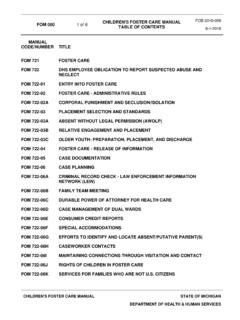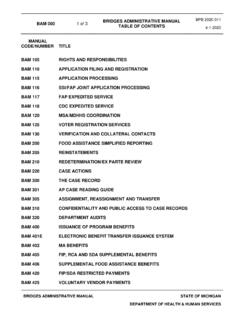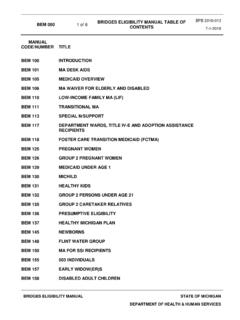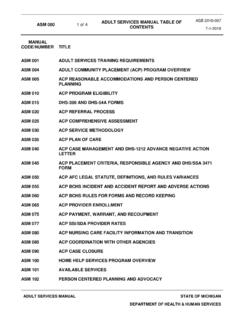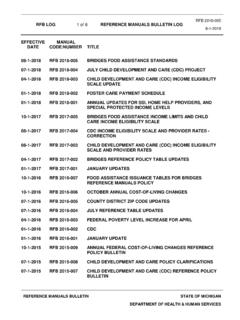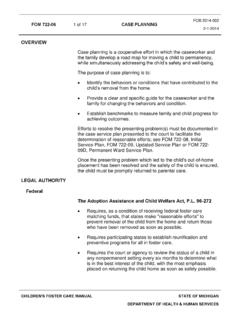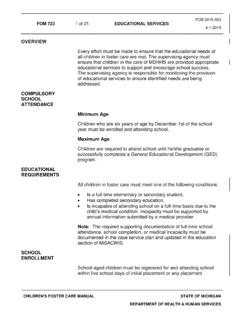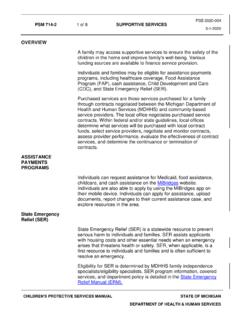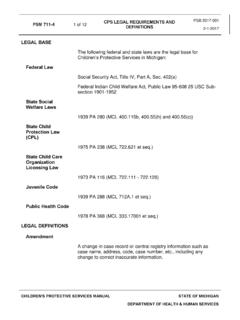Transcription of THE YOUTH IN TRANSITION (YIT) PROGRAM
1 FOM 950 1 of 19 THE YOUTH IN TRANSITION (YIT) PROGRAM FOB 2019-012 10-1-2019 CHILDREN'S FOSTER CARE MANUAL STATE OF MICHIGAN DEPARTMENT OF HEALTH & HUMAN SERVICES OVERVIEW A priority of the Michigan Department of Health and Human Services (MDHHS) is to improve the success of foster YOUTH transitioning into adulthood from the state s foster care system. The goal is to help young adults make the TRANSITION from foster care to independence, which is the ability to take care of oneself physically, socially, economically, and psychologically. Federal law mandates that state and local governments offer an extensive PROGRAM of education, training, employment, and financial support for a young person leaving foster care.
2 Participation in such programs must begin several years before high school completion and continue, as needed, until the YOUTH is discharged from foster care, establishes independence, or reaches 23 years of age. Independent Living Preparation Independent Living (IL) is an ongoing process of maturation, skill development, and assuming responsibility for self. IL services should provide practical experiences that are designed to assist YOUTH in developing the skills needed for a successful TRANSITION to adulthood; see FOM 722-03C, Older YOUTH : Preparation, Placement, and Discharge, for all requirements of IL preparation.
3 ELIGIBILITY CRITERIA In Michigan, Federal funding under the John H. Chafee Foster Care PROGRAM for Successful TRANSITION to Adulthood is called YOUTH in TRANSITION (YIT) funding. Federal law defines YIT eligible YOUTH as those who experienced foster care after the 14th birthday and who are under age 23; see FOM 721, Foster Care, for the definition of foster care. An eligible YOUTH can receive YIT-funded goods and services. Determination A YIT eligibility determination must be completed in MiSACWIS prior to any funding approval. When a YOUTH 's eligibility changes, a new determination must be completed.
4 Examples of eligibility changes are when a case goes from open to closed or from an ineligible placement to an eligible placement. FOM 950 2 of 19 THE YOUTH IN TRANSITION (YIT) PROGRAM FOB 2019-012 10-1-2019 CHILDREN'S FOSTER CARE MANUAL STATE OF MICHIGAN DEPARTMENT OF HEALTH & HUMAN SERVICES Age A YOUTH who has been placed in a MDHHS supervised foster care placement after his/her 14th birthday, and meets all other criteria, is eligible for YIT-funded goods and services until his/her 23rd birthday. Eligible Placements A YOUTH who has been in an eligible foster care or juvenile justice placement through the MDHHS, is eligible for YIT-funded services.
5 Eligible placements include: Licensed foster family homes. Relative provider homes. Group homes. Emergency shelters. Child caring institutions. Independent living and semi-independent living placements. Ineligible Placements YIT is not available while the YOUTH is in one of the ineligible placements. Facilities A YOUTH placed in an ineligible facility listed below may be eligible for YIT funding if released to an eligible placement. A public or private secure placement facility. A non-secure public child caring institution for more than 25 children.
6 Detention facilities, forestry camps, training schools, or other facilities operated primarily for the detention of children determined to be delinquent. Jail. Parental Home A YOUTH who continues to reside in the parental home, regardless of removal and out-of-home placement of siblings; see FOM 722-01, FOM 950 3 of 19 THE YOUTH IN TRANSITION (YIT) PROGRAM FOB 2019-012 10-1-2019 CHILDREN'S FOSTER CARE MANUAL STATE OF MICHIGAN DEPARTMENT OF HEALTH & HUMAN SERVICES Placement with Respondent/Adjudicated Parent and Siblings in Foster Care. A YOUTH removed from one parent and placed immediately with a non-offending parent, regardless of removal and out-of-home placement of siblings; see FOM 722-01, Placement with a Non-Offending Parent and Siblings in Foster Care with Court Jurisdiction.
7 A YOUTH who has reunified with a parent is YIT eligible if he/she was in a MDHHS supervised eligible placement at some point after his/her 14th birthday and meets all other criteria for eligibility. SPECIAL ELIGIBILITY SITUATIONS Juvenile Justice A YOUTH who has or had an open juvenile justice case and is, or was, placed in an eligible placement under the supervision of MDHHS after the 14th birthday is eligible for YIT-funded services until the 23rd birthday. This may include a YOUTH who has never had an open abuse/neglect case. It may also include a YOUTH committed to MDHHS and supervised under the County of Wayne's contract with a Community Management Organization (CMO).
8 A YOUTH in a secure setting or who is incarcerated is not eligible while in those placements. AWOLP/ Runaway If a YOUTH is Absent without Legal Permission (AWOLP) but returns to an eligible living arrangement the YOUTH is eligible to receive YIT funds, provided he/she meets all other eligibility criteria. Immigrant YOUTH Not Documented A YOUTH who is court ordered under the care and supervision of the department is eligible, whether or not he/she is a citizen or legal resident of the United States. FOM 950 4 of 19 THE YOUTH IN TRANSITION (YIT) PROGRAM FOB 2019-012 10-1-2019 CHILDREN'S FOSTER CARE MANUAL STATE OF MICHIGAN DEPARTMENT OF HEALTH & HUMAN SERVICES Tribal YOUTH A YOUTH placed and supervised by a tribal child welfare court may be eligible for YIT funds provided he/she meets all other eligibility requirements.
9 Married YOUTH A married YOUTH may be eligible for YIT funds provided he/she meets all other eligibility requirements. Incarcerated YOUTH An incarcerated YOUTH is not eligible to receive YIT funds. When a YOUTH is no longer incarcerated, he/she may receive YIT funds if he/she meets all other eligibility criteria. Closed cases A YOUTH whose case is closed and met all the eligibility criteria for YIT during the time he/she was under MDHHS supervision, is eligible for YIT if currently between the ages of 18 and 23. In some cases, a YOUTH whose case is closed and who fits the above criteria but is 16-17 years old may be eligible.
10 Exceptions may be made if all the following criteria are met: The YOUTH met the eligibility criteria for YIT while his/her case was open. A YIT-funded item or service was accessed prior to the case closing. Requested YIT services will support the YOUTH through the stages of TRANSITION . Requested YIT funds will be used to gain access to goods and services designed to assist the YOUTH to: Successfully prepare for, achieve, and maintain an independent living situation. Prepare the YOUTH for functional independence. Ensure the YOUTH s physical, social, economic, and psychological needs are met; see FOM 722-03C, Older YOUTH : Preparation, Placement, and Discharge.

